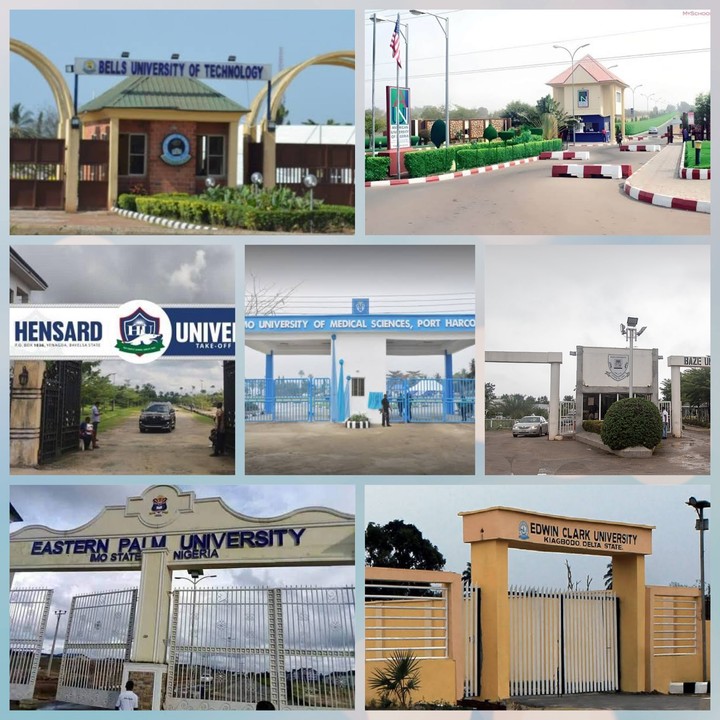Private universities or money laundering? The shady business of Nigeria’s politicians in the education sector
How Nigerian politicians own private universities amid public education crisis
Nigeria’s public universities are facing a severe crisis of funding, quality and industrial unrest, which has led many students and parents to seek alternative options in the private sector. However, some of the private universities in the country are owned by past and serving politicians, who have been accused of neglecting the public education system while enriching themselves with private institutions.
According to the National Universities Commission (NUC), the Federal Government of Nigeria has approved 147 private universities as of November 27, 2023, in addition to the universities owned by both the Federal and state governments respectively. The NUC also disclosed that it has over 270 pending requests for the establishment of new private universities.
A review of the private universities by PRISTINEGIST revealed that most of them are founded by religious organisations and political figures, especially former governors, senators and ministers. Some of the notable private universities owned by the Nigerian political class are:
– Bells University, Ogun state: Founded by former president, Olusegun Obasanjo, the institution also has on its board a former governor of Gombe state, Ibrahim Dakwambo, and a former senator representing Ogun Central, Iyabo Obasanjo-Bello.
– American University of Nigeria, Yola, Adamawa state: Owned by a former vice-president of Nigeria and the presidential candidate of the Peoples Democratic Party in the 2023 general elections, Atiku Abubakar.
– Amaj University, Kwali, Abuja: Owned by a former governor of Sokoto state, Attahiru Bafarawa. The University received its license in 2023 and is one of the youngest private universities in the country.
– Hensard University, Bayelsa state: Owned by a former governor of Bayelsa state, Seriake Dickson. Like Amaj University, Hensard is also one of the newly licensed private universities in Nigeria.
– PAMO University of Medical Sciences, Rivers state: Owned by a former governor of Rivers state, Peter Odili. The institution is the first private medical university in Nigeria and has on its board, former military administrator, Gen. Abdulsalam Abubakar, a senator representing Katsina South, Abu Ibrahim.
– Baze University, Abuja: Owned by a one-time senator and vice presidential candidate of the Labour Party during the 2023 presidential election, Datti Baba-Ahmed.
– Eastern Palms University, Imo state: Owned by a former governor of Imo state and senator who represented Imo West senatorial district in the ninth senate, Rochas Okorocha.
– Edwin Clark University: Owned by a former federal commissioner of Information and elder statesman, Edwin Clark.
– Sports University, Delta State: Owned by a current senator, Ned Nwoko. He obtained the license for the institution in 2021 and it is the first private university of sports in Nigeria.
Some other private universities also have past and serving politicians as members of the Board of Trustees and governing councils. For instance, The current First Lady and former senator representing Lagos West senatorial district, Remi Tinubu is a member of the board of trustees at Kings University in Odemu, Osun state. The Governor of Ondo state, Rotimi Akeredolu, SAN is a member, board of trustees, Achievers University. The Chairman, Nigerians in Diaspora Commission, Abike Dabiri-Erewa, Senator representing Imo West senatorial district, Osita Izunaso among others sit on the governing council of Abuja-based Nile University. A chieftain of the Peoples Democratic Party, Sam Ohuabunwa is the Chairman of the Council, Gregory University Uturu in Abia state. Kaduna-based Greenfield University also has on its board, a former member of the Eighth House of Representatives, Muhammed Usman as a member among others.
The proliferation of private universities by the political class has raised questions about their motives and their commitment to improving the public education system, which has been plagued by poor infrastructure, low academic standards, inadequate funding and frequent strikes by lecturers and staff. Some critics have argued that the politicians are using the private universities as a means of laundering their ill-gotten wealth and exploiting the demand for quality education in the country. Others have called for more regulation and accountability of the private universities to ensure that they meet the minimum standards of quality and relevance.



